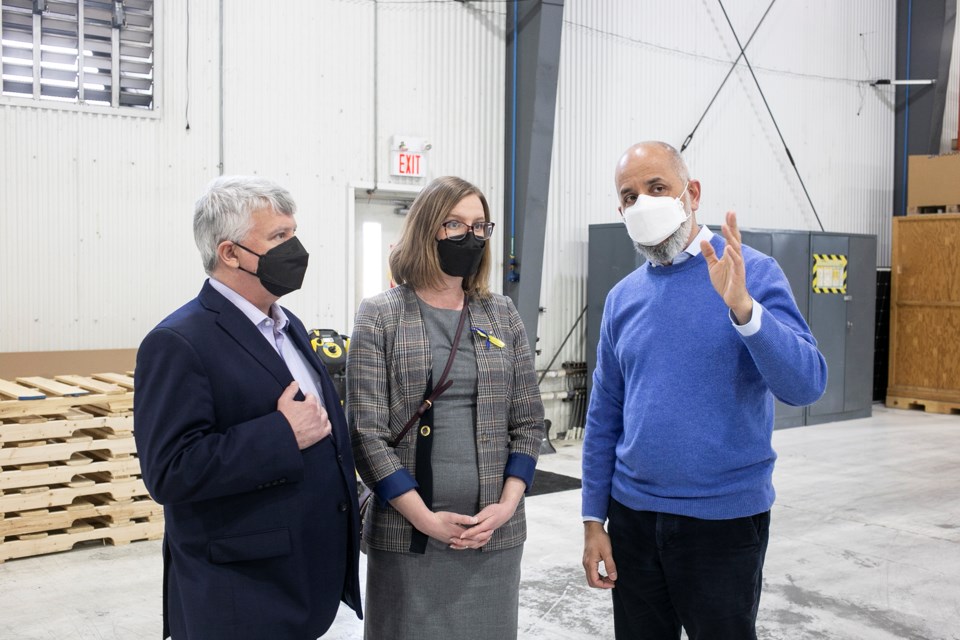A federal cabinet minister was in Sault Ste. Marie on Thursday to speak about jobs for the clean economy and the future of $10 a day daycare.
Karina Gould, minister for Families, Children and Social Development, made numerous stops in Sault Ste. Marie on Thursday, including the Heliene Inc. solar photovoltaic module plant, a daycare centre and Service Canada location.
Touring the Heliene plant, Gould met four employees hired through the Rural and Northern Immigration Pilot. The company was able to find highly skilled engineers and other positions from countries like India, Mexico and China.
Heliene’s president and founder Martin Pochtaruk told Gould it is more challenging to convince skilled workers to move to Sault Ste. Marie from other parts of Canada than it is to hire from outside of the country.
Gould noted the labour shortage being experienced in Canada means unemployment is low and the economy is doing really well
“Now for our businesses and communities to keep growing we need that skilled work force,” she said.
The Canadian government is expecting to welcome 400,000 newcomers this year alone and using programs like the Rural and Northern Immigration Pilot to attract skilled workers and their families to help communities like Sault Ste. Marie to meet their growth targets.
“What an excellent program, bringing people with the skills that they need,” said Gould. “We want to keep attracting talent to the Sault and really support this community.”
Gould said the workforce at Algoma Steel is expected to look different over the next few years as the manufacturer transitions from conventional steel making to electric arc steel making.
“It’s not really about losing jobs, it’s about changing jobs,” said Gould. “We are always going to need skilled workers, we are always going to need tradespeople who know how to build, repair, maintain and do all of that stuff as we electrify.”
Terry Sheehan, MP for Sault Ste. Marie, noted the federal government’s $420 million investment is about anchoring the business in the city for years to come.
“They will be trained, retrained, offered other positions within Algoma Steel because it’s just like every other industry, it’s facing labour shortages,” said Sheehan about the current workers at the plant.
Gould said the government is working closely with employers and colleges to train workers to work for industry working to transition to green and clean technology.
“Most of the colleges in Ontario and across the country are developing programs to do that transition, but we might actually need the skills that you have, just doing something slightly different,” said Gould. “People think about the green transition and think we are going to lose jobs — no, we are going to need lots of jobs and we are going to need lots of skilled workers. They might be slightly different, but we are still going to need welders and millwrights.”
Steel is an important industry for Canada and Gould said the green steel that will be produced when the electric arc furnace lights up will give it a competitive advantage.
“It’s such an important industry for us when it comes to auto manufacturing in Canada, we rely on domestic steel at Honda, at Ford and Toyota, and as well in the northern United States because a lot of the steel goes across the border, as well,” she said. “It’s about maintaining that supply chain and obviously we can’t do that without the skilled workforce we have here.”
Gould also planned to meet with daycare workers in the Sault on Thursday to speak about the federal and provincial partnership to bring $10 a day daycare to Ontario by 2025-26.
“I am so happy that Ontario finally signed on. It took them way too long, in my opinion. This agreement was on the table in July and the government of Ontario could have signed it in July but they decided to do it March 28, four days before the end of the fiscal year. Nonetheless they signed on,” said Gould.
In the 2021 federal budget the Liberals committed $30 billion over the next five years toward the daycare project. Gould said the intention is for those federal dollars to supplement what is spent at the provincial level.
“No federal dollar is displacing a provincial dollar. The province has to commit and has promised that they will continue to send their money that they already are doing on child care and everything the federal government is doing is additional,” she said.
Although the $10 a day daycare isn’t expected to be fully implemented in Ontario for a few years, by December of 2022 the daycare fees will be cut in half in the province.
In addition, work is being done to ensure more spaces will soon be available to those who are on a waiting list in communities like Sault Ste. Marie. Gould said $625 million has been allocated to spend on daycare infrastructure in rural, remote and northern communities to address this.
“We recognize that reducing fees is incredibly important to parents who have a child in licensed care because it’s astronomically expensive, but it’s not enough because there are too many parents who are also waiting for a space to open up,” said Gould.
An additional 40,000 spaces are expected to be added in the next two years, which will also necessitate the attraction and retention of early childhood educators to cover that increase in the number of children that will be serviced.
“We have a minimum wage now for ECEs in Ontario. I would like to see it be more, but of course that is something the province dictates, we just require they have that minimum wage,” said Gould. “I know there is a provincial election coming up, so certainly asking for increased wages, benefits and supports for ECEs I think would be really important.”
